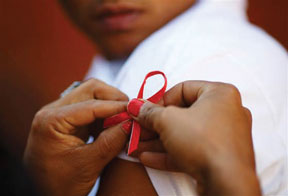 Targeted radioactive Bomb Might Clean Out AIDS Virus, Study Finds
Targeted radioactive Bomb Might Clean Out AIDS Virus, Study Finds
Maggie Fox NBC News
A red ribbon is put on the sleeves of a man by his friend to show support for people living with HIV to raise awareness about AIDS.
A radioactive smart bomb might help mop up the last bits of AIDS virus hiding out in a patient’s body, even getting into the brain, re-searchers reported recently.
The approach is part of a new effort to try to cure AIDS. After 30 years of fighting the deadly and in-curable virus, scientists think they may be able to find a way to really kill it. On Monday, the White House and the National Institutes of Health announced a new, $100 million effort to try to find a cure.
In the latest study, researchers tested a modified version of a therapy now used to treat leukemia on blood taken from 15 patients with HIV, and found evidence it could scour out infected cells. These so-called latent cells are the main reason that HIV cannot be cured – they lie low in the body, quietly resting until drug treatment stops, and then roar back into action.
Ekaterina Dadachova of the Albert Einstein College of Medicine at Yes-hiva University in New York and colleagues have been working with a cancer treatment called radio-immunotherapy to see if they can get rid of these latent cells.
The treatment uses a monoclonal antibody – an engineered version of a human immune system virus, tied to a bit of radioactive material called bismuth-213. The antibody is designed to recognize HIV, and it homes in on an infected cell, delivering a deadly dose of radiation.
“The radionuclide we used delivered radiation only to HIV-infected cells without damaging near-by cells,’ Dadachova said. “It is not dangerous because the whole idea of radioimmuno therapy for HIV is using an isotope that can precisely target infected cells.”
Tests in mice have shown the treatment can wipe out all infected cells in the body – or at least all the cells that could be detected using current methods. So the team tried it out on 15 patients being treated for HIV.
It killed the infected cells that were still circulating in the patients, and even penetrated into the brain – something that not many drugs can do – Dadachova told a meeting of the Radiological Society of North America.
The human immunodeficiency virus that causes AIDS infects 35 million people globally and has killed another 36 million, according to the United Nations.
There’s no cure and experimental vaccines work only poorly. Drug treatment called antiretroviral therapy can keep the virus suppressed to such low levels that patients are healthy and much less likely to infect others.
But there are always a few pesky bits of virus remaining, and if the drug treatment is stopped, they usually start pumping out more virus again. However, in a few extremely rare cases, patients appear to have been cured.
The most publicized cases involve three men with blood cancers who were treated with bone marrow transplants. They’re all potentially cured, years after treatment. The extremely toxic treatment to destroy their own bone marrow cells and replace them with transplants appears to have eradicated not only their cancer, but their HIV infections.
There’s another, more experimental approach to destroying the cancerous cells. It uses the radioactive monoclonal antibodies to target and destroy leukemia cells, and while it’s still considered highly experimental, it’s being tested against a range of cancers.
One problem with trying to eradicate HIV is that it can really hide inside a cell, says Dr. Clyde Crumpacker of Beth Israel Deaconess Medical Center and Harvard Medical School in Boston. “Some of the HIV-infected cells may be completely flying under the radar of the immune system,” Crumpacker said in a telephone interview.
Antibodies know which cells to attack because they “display” little pieces of protein on their surfaces. But HIV integrates itself right into the DNA of a cell, and experts believe it can infect cells without displaying any parts of itself.
If that’s the case, there’s no way for even a smart monoclonal antibody to find it.
“One of the pitfalls is that we don’t know the full extent of the HIV reservoir,” Crumpacker said. But, he added, experiments like Dadachova’s “show great promise and should be vigorously tested.”
Dr. Anthony Fauci, director of the National Institute of Allergy and Infectious Diseases, says the approach is highly experimental at this point. “It hasn’t been administered to people yet,” he points out.
Dadachova said her team is seeking permission and money to run tests in patients both in South Africa and the United States.
Cash for medical research has been cut along with other budgets in the U.S., especially in the current round of drastic cuts forced by Congress and its inability to agree on a federal budget. But NIH is finding a way to direct extra money to AIDS research.
“Whether we can get a cure in the classic sense is unclear but it is worth a try,” Fauci says.
“Flat budgets and cuts from sequestration have had a profound and damaging impact on biomedical research, but we must continue to find ways to support cutting-edge science, even in this environment,” NIH Director Dr. Francis Collins said in a statement released late Monday.
“AIDS research is an example of an area where hard-won progress over many years has resulted in new and exciting possibilities in basic and clinical science in AIDS that must be pursued.”
